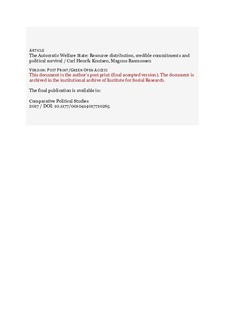| dc.contributor.author | Knutsen, Carl Henrik | |
| dc.contributor.author | Rasmussen, Magnus | |
| dc.date.accessioned | 2018-01-03T11:33:43Z | |
| dc.date.available | 2018-01-03T11:33:43Z | |
| dc.date.created | 2017-06-23T12:56:32Z | |
| dc.date.issued | 2017 | |
| dc.identifier.issn | 0010-4140 | |
| dc.identifier.uri | http://hdl.handle.net/11250/2474323 | |
| dc.description.abstract | In this article, we argue that autocratic regimes are no less likely than democracies to adopt old-age pensions, although autocratic programs are less universal in their coverage. Our theoretical argument focuses on the strong incentives that autocratic regimes have for enacting and maintaining such programs to ensure regime survival. Autocratic pension programs can be considered club goods that (a) are targeted to critical supporting groups and (b) solve credible commitment problems on promises of future distribution, thereby mitigating probability of regime breakdown. We test three implications from the argument, drawing on a novel dataset on welfare state programs and including 140 countries with time series from the 1880s. First, we find that autocracies are no less likely than democracies to have old-age pension programs. But, second, autocracies have less universal pension programs than democracies. Third, pension programs effectively reduce the probability of autocratic breakdown. | |
| dc.language.iso | eng | |
| dc.title | The Autocratic Welfare State: Resource distribution, credible commitments and political survival | |
| dc.type | Peer reviewed | |
| dc.type | Journal article | |
| dc.description.version | acceptedVersion | |
| dc.source.journal | Comparative Political Studies | |
| dc.identifier.doi | 10.1177/0010414017710265 | |
| dc.identifier.cristin | 1478513 | |
| dc.relation.project | Norges forskningsråd: 257603 | |
| dc.relation.project | Norges forskningsråd: 240505 | |
| cristin.unitcode | 7437,0,0,0 | |
| cristin.unitname | Institutt for samfunnsforskning | |
| cristin.ispublished | true | |
| cristin.fulltext | postprint | |
| cristin.qualitycode | 2 | |
